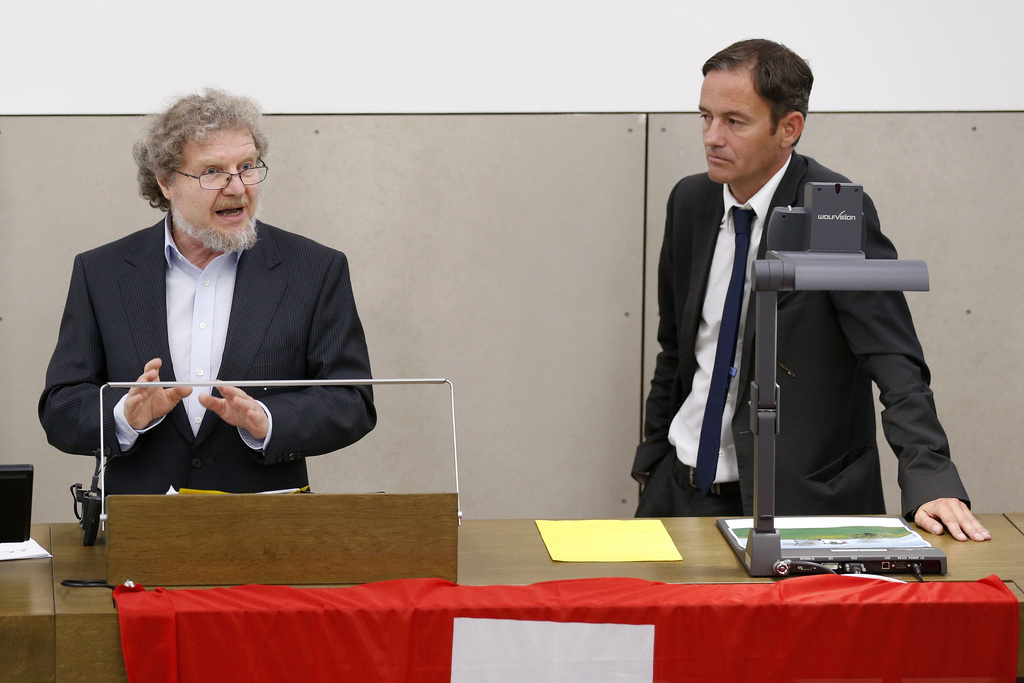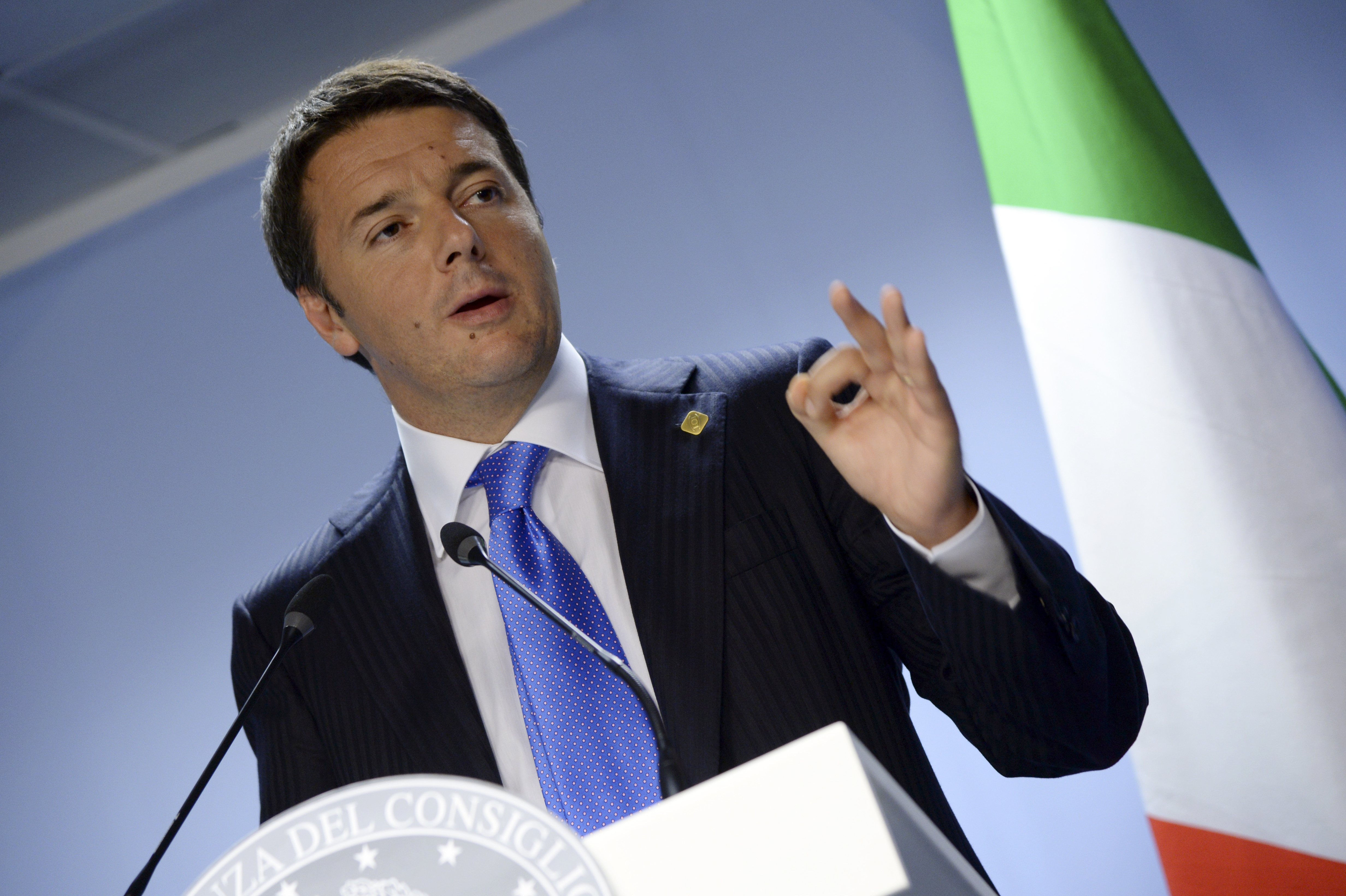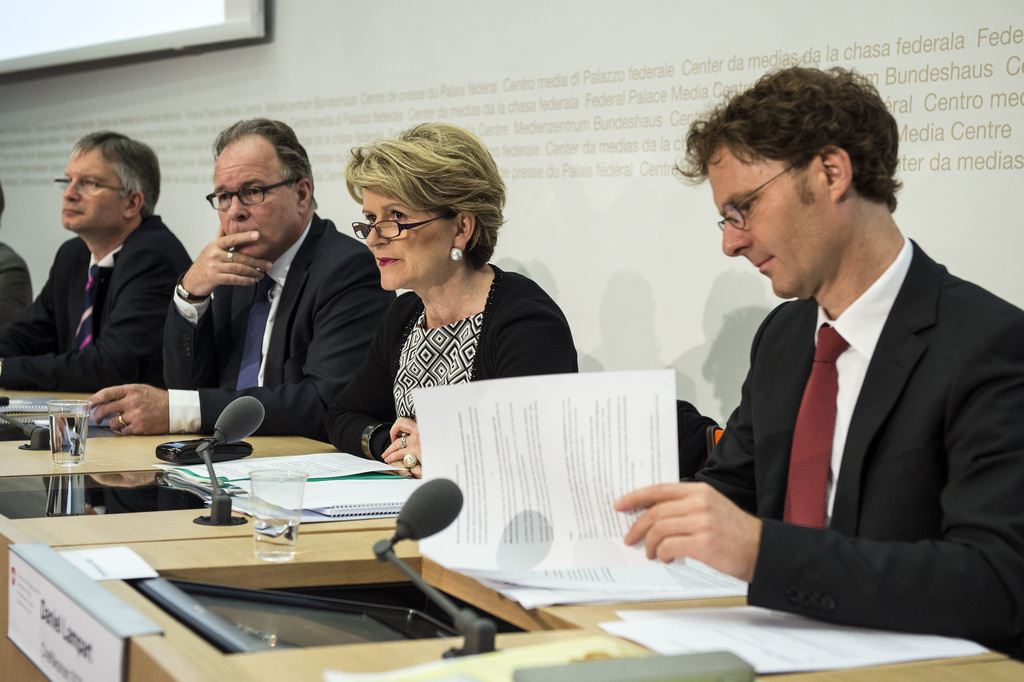‘Switzerland is already a part of Europe’

Scepticism of the European Union has been growing. After Switzerland's recent anti-immigration vote, is EU accession finally off the table? No, say the new co-presidents of the New European Movement Switzerland.
Thirteen years ago – less than a year after they had approved the bilateral treaties with the EU – Swiss voters decisively rejected an initiative calling for immediate accession negotiations with the EU. Since then, the issue of EU membership has disappeared from the political agenda, and not much has been heard about the New European Movement SwitzerlandExternal link.
Change at the top of the organisation led to a few headlines. Following the resignation of Christa Markwalder of the Radical Party, the movement is now headed by Martin Naef from German-speaking Switzerland and François Cherix from French-speaking Switzerland. Both co-presidents are from the centre-left Social Democratic Party.
swissinfo.ch: Are you sharing the role so that you are not fighting a losing battle alone?
Martin Naef: The battle is not lost. On the contrary. With the co-presidency, we cover two language regions. It is a good opportunity to anchor the idea of Europe in Switzerland.
swissinfo.ch: No matter where you look, there is no evidence that a majority in Switzerland would decide to join the EU.
François Cherix: It’s becoming apparent that Switzerland is marching towards its moment of truth: that is to say that we may soon come face to face with isolation or accession. And from that perspective, I’m not at all sure the Swiss will choose isolation.
swissinfo.ch: Apart from left-of-centre political parties – the Social Democrats and the Green party – joining the EU is not supported by any major party. To win, you need majorities and at least some voices in the middle of the political spectrum.
M.N.: On February 9 we experienced a watershed. I hope that the economy and civil society have realised that all constructive forces need to collaborate against isolation.
swissinfo.ch: Since February 9, even the bilateral treaties are at risk. Would it not be more pragmatic to focus on this path, rather than to aspire to the utopian goal of joining the EU?
M.N.: We think it’s right that one day Switzerland should be able to have its say about things in Europe which affect us here. The New European Movement Switzerland has always supported effective solutions in a reliable relationship with the EU.
F.C.: We have proof that the goal of the movement is not unrealistic. Since February 9, 400 new members have joined us spontaneously. That’s quite significant given the size of our movement.
swissinfo.ch: In 1992, after the electorate voted against joining the European Economic Area (EEA), you predicted a disaster for Switzerland. When you compare us with the EU today, isn’t Switzerland rather better off?
F.C.: It happened exactly as we said it would. For ten years or so, Swiss growth stagnated or declined. It was lower than that of neighbouring countries. In fact it is precisely Bilateral Agreements I and II which allowed Switzerland to compensate for rejecting the EEA and return in an extremely positive way to the European market.
A solution was found, but it was a precarious situation of catching up. All our studies have shown that the situation in Switzerland with only bilateral agreements is fragile, dangerous, unsustainable and will one day require further discussion. Today we have arrived at this point.
In fact, the current situation is much more serious than in 1992, because Switzerland has broken or savaged the agreements it had itself requested and in which it was already integrated.
M.N.: Isolation is not an option for our country. Switzerland is doing well not because we have no relations with Europe but because with the bilateral treaties we have reliable relations with the other countries of the EU. If Europe is doing well, then Switzerland is also doing well.
swissinfo.ch: Scepticism towards the EU has increased not only in Switzerland but also in the member states . . .
M.N.: There’s plenty to criticise in the EU: the institutions, the separation of powers, lack of democratic or parliamentary participation.
Switzerland would have the same weight in the EU in terms of population size as canton Neuchâtel has in Switzerland. Citizens there would never say that national policy doesn’t suit them so they are going to make a customs union with the other cantons but don’t want a voice. That would be absurd. Switzerland is already a part of Europe. Waiving participation but still being affected – I find that undemocratic and unworthy of a sovereign country.
swissinfo.ch: You are both members of the Social Democrats, a party which often makes use of popular initiatives and referendums. How do you see Switzerland in an EU that gives the people no direct democratic instruments?
M.N.: In terms of democracy, citizen participation or subsidiarity, there is a need for action in the EU and many people in Brussels have become aware of that. European Commission President Jean-Claude Juncker has recently admitted that they have forgotten to carry the people along with them. And the head of the European Parliament, Martin Schulz, has very aptly said that the EU shouldn’t be worrying whether olive oil bottles on restaurant tables need to be open or closed. In this area too, Switzerland could contribute a lot.
But no one need fear that [instruments of direct democracy] would be utterly incompatible. If we had joined the EEA 20 years ago, there would have been a problem twice with our direct democracy. It was twice the case with left-wing issues: the Alpine Initiative transferring freight from road to rail and the moratorium on genetic engineering.
F.C.: We have to stop thinking of the European Union as a state. It’s more an embodiment of international law and a not fully defined association of states where the states themselves have a leading role.
swissinfo.ch: Has a popular initiative for EU accession receded into the distance then?
F.C.: I don’t think we should picture membership as a single decision to be taken at once. The process involves a series of steps with choices each time.
swissinfo.ch: But participation in the EU, which you mentioned, is rather illusory. It’s always the strongest economies which impose their will and their policies on other countries.
F.C.: This idea of Europe being a single bloc dominated by the big players is completely belied by reality. For example, they’ve been playing a game over the next president of the European Commission which is extremely complex, and you can play these extraordinarily interesting divisions even if you are small, because of the alliance building, diplomacy, balances which vary greatly. We Swiss are experts at this kind of thing. We would not only feel comfortable but we would be very good at it. And yet it’s mad that we use characteristics of Switzerland to criticise eventual participation in the EU.
M.N.: Already before February 9, the EU said that it’s not continuing with this bilateral approach, that an institutional framework is needed for future relations.
swissinfo.ch: You say it would take a lot of time before the Swiss voted in favour of EU accession. Do you have a specific timetable?
M.N.: We don’t want to be campaigning like missionaries. We have no one like former [rightwing] parliamentarian Christoph Blocher who can give us CHF5 million for a campaign. But we have a more nuanced argument than just saying “Foreigners out”, “No to the EU”, “Down with taxes”. Those things are easy to sell, but discussions like this one, I find more interesting and purposeful.
With two Social Democrats sharing the co-presidency – Martin Naef, a member of the House of Representatives, and former Vaud Cantonal parliamentarian François Cherix – the strategic management of New European Movement Switzerland is in centre-left hands for the first time. Before that, it had always been Radical politicians who fronted the pro-European organisations in Switzerland, including former Cabinet member Jean-Pascal Delamuraz. For three years, from 1981, Delamuraz headed the New European Movement’s predecessor, the Europa Union, which was established in 1934. The New European Movement Switzerland was formed in 1998 from the merger of different pro-European groups.
The aim of the organisation is Switzerland’s accession to the EU “under the most favourable conditions to obtain the right to vote in Europe”. The organisation has about 3,400 members today.
(Translated from German by Vincent Landon)

In compliance with the JTI standards
More: SWI swissinfo.ch certified by the Journalism Trust Initiative




You can find an overview of ongoing debates with our journalists here. Please join us!
If you want to start a conversation about a topic raised in this article or want to report factual errors, email us at english@swissinfo.ch.